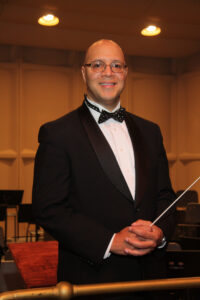
Chelsea Tipton, conductor
GREENSBORO, NC – The final contender for the Greensboro Symphony Orchestra‘s Music Director baton was Chelsea Tipton, who appeared Saturday night leading the ensemble in music from the last three centuries. Tipton, who is a native of Greensboro, spoke to the audience several times through the course of the evening, explaining both details about the music as well as his long relationship with the music scene here and asking the audience to demonstrate its appreciation for the hard work of the musicians in the GSO.
The evening opened with the dazzling AMEN! (2017) by Carlos Simon (U.S., b. 1986). According to the composer, the work “. . . is an homage to my family’s four-generational affiliation with the Pentecostal church.” The three movements, played without a break, are titled “Lively,” “Soulfully,” and “Mysteriously: Lively.”
The opening employed about every percussion instrument you could imagine, utilizing six exuberant percussionists. Add a brass choir and spikey strings and you get a musical depiction of “an exuberant choir and congregation singing harmoniously together . . .” The second movement incorporates the hymn “I’ll Take Jesus for Mine,” and several soloists added soulful inflections to the bluesy context. The finale featured great syncopations that eventually moved to “a frenzied state, emulating a spiritually heightened state of worship.” The GSO sounded great, playing the piece with appropriate swagger and gusto.
American violinist Andrew Sords was the soloist in the four-movement Scottish Fantasy (1880) by Max Bruch (Germany, 1838-1920). Sords has won many awards including the Pittsburgh Concert Society’s Career Grant and has played on three continents. His playing throughout the work was a delight to hear. GSO principal harpist Helen Rifas was brought to center stage to join the soloist for Celtic flair. (The German title actually translates as “Fantasy for Violin with Orchestra and Harp.”)
Scottish Fantasy is based on Scottish folk songs including “Auld Robin Morris,” “Hey, the Dusty Miller,” “I’m a-Doun for Lack o’ Johnnie,” and “Scots Wha Hae.” The opening movement is primarily plaintive, and Sords’ affecting playing of the gorgeous melodies, often soaring into the stratosphere, was a perfect match. The Scherzo second movement contained more lyric tunes, but also lots of fire where the violinist displayed some of his impressive technique. The more serene third movement allowed Sords to spin out lengthy beautiful lines. The rousing finale features double- and triple-stops which Sords made sound like child’s play.
Rousing applause from the audience brought the violinist back to play a ridiculously fiendish tour-de-force showpiece for violin, by Henri Vieuxtemps (Belgium, 1820-81): “Souvenir of America.” You have never heard “Yankee Doodle” transformed so delightfully into a vehicle for fiddling, harmonics, and double- and triple-stops. A real crowd pleaser!
After intermission, the GSO played Pomp and Circumstance No. 1 (1901) by Sir Edward Elgar (England, 1857-1934). The central section contains the ubiquitous tune “Land of Hope and Glory,” perennially used for high school and college graduations. The outer sections are less familiar, but the GSO’s sturdy playing was exciting.
The high point for this listener was the performance of Der Rosenkavalier Suite (Opera 1910, Suite 1945) by Richard Strauss (Germany, 1864-1949). Tipton informed the audience that the piece “is really hard.” The playing of this stunning five-movement piece highlights the composer’s brilliant orchestration. Interestingly, the suite was most likely arranged by the conductor Artur Rodzinski with the composer’s approval.
The suite utilizes some of the three-hour opera’s most memorable and sumptuous tunes. Whooping horns recall a night of passion, as well as tender tunes and a couple of waltzes. Two harps added a distinct timbre, and several solos from the orchestra’s principal chairs, including oboist Mary Ashley Barret and violinist Marjorie Bagley, were finely played. Tipton’s conducting made the most out of dynamic shading, adding depth to the performance. The conclusion was particularly brilliant, and the crowd roared its approval, calling Tipton back several times before the applause finally faded.










